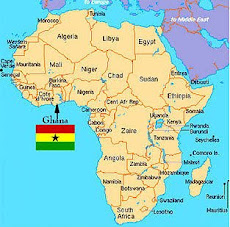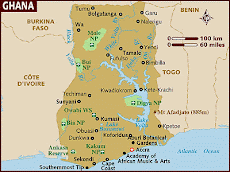The Director organised an end-of-year “round the table” discussion on Thursday evening to assess the year’s work, and to eat and drink. It was a very open meeting, with most people taking turns to stand up and say what they had observed about the work of the Service and how it can be improved.

There was then food for everyone, including beef, which is only eaten on very special occasions. The women who work in the office prepared the food for everyone – Gender roles are very deeply ingrained.


The dry season has now really set in. There is a real problem in the area with deforestation. Trees are cut down everywhere for fuel and the amount of savannah grassland is forever increasing. In the dry season, this leads to a number of local fires that are caused accidentally. In addition, food is short in many families and some people deliberately set fire to the grass, so that the bush rats will run out of the bush to escape the fire. The rats can then be speared, cooked and eaten.
All of this means that the surrounding countryside is a mixture of parched brown and burnt black, with the occasional tree adding a bit of green.

We are looking forward to seeing more tropical greenery, as we head South over the holiday period.
Sunday 20th December – Diary of the bus journey to Kumasi.
8.00 a.m. We are at Wa bus station having our tickets checked and our luggage weighed. Tickets cost us approximately £5 each for a 5/6 hour journey. We are travelling by STC, the State Transport Company.
9.30 a.m. The bus was due to leave at 9.00 a.m., but the loading hasn’t yet started. Two men are attacking the engine, one with a spanner and one with buckets of water. We think there might just be a problem! All the passengers are waiting patiently, completely unperturbed. We’ve decided to settle down and read our books.

11.00 a.m. The bus is on its way. Yippee.
11.30 a.m. The passengers are very quiet; many are dropping off to sleep. We are passing through a very parched landscape with huge termite mounds and the occasional mud-built village.
11.40 a.m. The bus has been chugging rather slowly. We have stopped twice in the last 10 minutes to put water into the engine. We are now completely stationary, with a lot of people looking at the engine and scratching their heads. All the passengers are chatting calmly, and the children are enjoying a run outside the bus – back to reading our books.

12.40 p.m. We have chugged along for another stretch, stopping by every available water supply to collect water to cool the engine.

1.30 p.m. The air conditioning has been switched off, because of the overheated engine. This is the hottest part of the day, and the bus is hot, hot, hot ........ We are conserving our personal drinking water supplies.
2.00 p.m. Another water stop. All the women from the local village seem to be out doing their washing by the side of the road. We are trying to practice our Waali with them, but sign language and lots of smiles are proving to be much more effective.

3.45 p.m. Another stop – on the edge of a town this time. The whole bus empties, as we dash to the nearest shop to buy drinks – wonderful. Apparently, a replacement bus is being sent to us. Meanwhile, we are sitting on the road by the edge of a lake, as we begin to appreciate the cool of the late afternoon and watch the local women doing their washing. (No idea where the men are; they must be extremely busy somewhere.) At this point, we are not far from the border of Cote d’Ivoire.

5.00 p.m. Still here. People are sharing food with each other. The children have now plucked up courage to touch our skin and shake our hands. They are now calling us Aunty Nansarla and Uncle Nansarla (white person). There is a really great atmosphere.
6.00 p.m. Still here – and we are getting pretty tired. However, we are making progress with 2 very good books: The Robber Bride by Margaret Atwood and The thing Around Your Neck by Chimamanda Ngozi Adichi (a series of short stories set in West Africa). Key learning point; carry a good book whenever travelling in Ghana!
6.15 p.m. Still here. It’s now getting dark. The bus is being unloaded – and we really don’t know why we are surprised that a live goat is being brought out amongst all the suitcases from the luggage compartment under the bus. The children are singing every English song they know to us. The mosque across the road is calling people to prayer. We are settling down on the ground outside watching the moon and stars.

8.15 p.m. Still here ...........but a replacement bus has just arrived. We are all coming to life again, having lulled ourselves into a half-sleep.
9.00 p.m. We’re off. There’s a general air of hilarity (or maybe it’s hysteria), as the driver has a bit of difficulty starting the bus.
2.30 a.m. Monday We have arrived in Kumasi. Much of the journey through the night was smooth. Some of it was very bumpy, as we negotiated rough, unsealed roads. Now to our taxi and on to the hotel ........phew.
2.35 a.m. Whoops. We have left some of our things on the bus, and the bus has set off again, heading for Accra. Our taxi driver is great and does a mad chase to catch up with the bus .......Success. We have managed to get our things back. The people on the bus seemed pleased to see us again! Those who were still awake anyway.
3.00 a.m. In our hotel. Lots of shiny marble everywhere – unreal. Warm shower – bliss.
3.30 a.m. Good night. Zzzz.........


